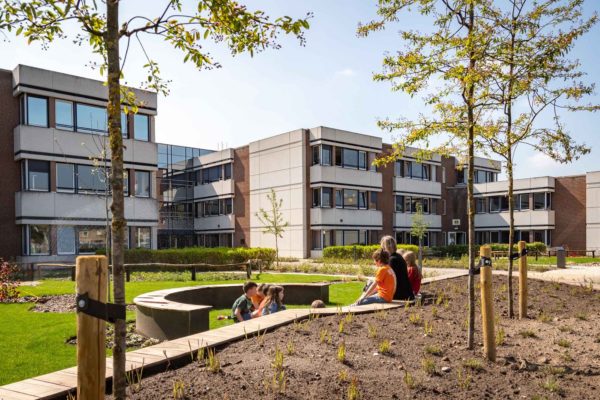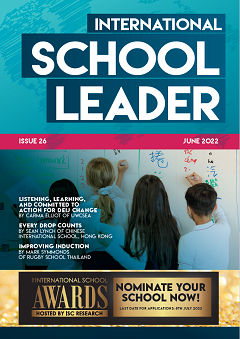By Kathy Wood MBE
In 2019, AFNORTH International School was flying high, following a cultural shift that placed Values-based Education at the core of its work. We were optimistic about our future together. However, with the onset of the COVID-19 pandemic, the innovative and ambitious international model for education that had seen four different national sections, and six school sections, collaborate to establish and embed a commonly agreed ethical values approach was ‘attacked’ overnight.
Suddenly, our whole-school identity, the sense of belonging we had worked hard to re-establish and the ethical values underpinning the work across national boundaries were being physically challenged by an invisible and unknown phenomenon.
Leaders faced the immediate dilemma of how to maintain international cohesion whilst responding to the implementation of five very different national approaches to the pandemic, each one threatening to divide and rule our international community. On reflection, it was the ethical core values that we had established and embedded (ISL Magazine September 2020) that guided us in our decision-making. It steered us through the tumultuous COVID-19 currents and helped us to optimise recovery with speed and power to provide what Fullan (2022) describes as a transformational ‘runway’ to future learning.
For leaders undertaking post-crisis follow-up planning, the strong message is to focus energy on bringing together the community, avoid thinking you can continue as before as charging ahead is unrealistic and inappropriate. For us, we set about joining the forces of wellbeing and learning by establishing Atalanta – Our Friendship Garden.
“Focus energy on bringing together the community.”
Avoiding academic islands
Designing and creating a sensory garden was our response to leading recovery through positive contagion, an approach passionately advocated by Michael Fullan in his paper ‘Six Reasons to be Optimistic About Learning in 2022’.
Like many schools leading the recovery, we needed to find a way of not only getting back on track, but we had an added dimension that each of our national sections had experienced different internal approaches to managing the impact of the pandemic. For example, despite an overarching school consensus, some nations approached remote learning, social distancing and mask-wearing very differently within the individual classroom environment. These elements impacted the range and intensity of emotions experienced across cultural boundaries.
Our staff and children expressed extreme loneliness and grief associated with being unable to socially connect with their international buddies and their immediate family, friends and peers as our communities temporarily live away from their home base. Leaders used the values-based work as a catalyst to bring the forces of wellbeing and learning together – one of the six themes Fullan cites as determining the quality of our future, maybe even ‘our very existence’.
Acknowledging that communities worldwide were feeling exhausted, our mental health was fragile and wellbeing is essential for learning, we set up a project that explicitly sends the message that, as leaders, we recognise the challenges we have faced. We know we need to make time to nurture our mental fatigue and that we need to move away from the sedentary patterns and routines that have become commonplace throughout the last two years. We need to get moving!
Why a garden?
We planned a garden to stimulate an innate sense of wonder and reignite our senses and positive feelings about life. For children and staff returning from almost two years of isolation, being immediately involved in a project celebrating the diversity of life on earth was stimulating and refreshing. The garden was viewed as the catalyst for renewing rituals and traditions that enhanced our interconnectedness and celebrated our unique individuality as nations. Individuals openly expressed that the challenges of remote learning and lengthy lockdowns of our AFNORTH community had made people feel isolated, left out, and digitally connected but lacking companionship.

The silent pandemic
Children and adults cannot help to have some form of response to a garden, and research supports that gardens promote social health and community cohesion on many levels. Most individuals will see a garden as an outdoor space intentionally constructed and set aside for peace, quiet and contemplation, enabling visitors of any age to experience the beauty of silence and, perhaps, even to explore meditation. For leaders to explicitly encourage time just to ‘be’ – time to stop and stare – is important. This priority to just take a moment can be pushed down the priority list in a busy school full of scheduled activities.
Acknowledging that a ‘silent pandemic’ had taken hold during COVID times was part of our runway journey. We focused energy on bringing the community back together. Explicitly recognising the stresses on our mental wellbeing and the urgent need for our community to benefit from having time to process, consolidate and replenish the inner emotional and spiritual balance while developing a better relationship between self, others and the created world was a critical healer.
Students of all ages have demonstrated deep reflection and expressed that spending time in their garden can alleviate their worries and help them to ‘escape from the world’s worries’.
Sustaining the contagion
From the outset, students and staff actively participated in the creative decision-making process. For example, choosing the design, name, plants and resources (insect hotels, sundials, seating); setting out the expectations and behaviours that need to be respected when residing in our garden; reporting the journey; and planning the detail of the official opening.
Mirroring the natural world and nature, hands-on projects will continue to grow and evolve in Atalanta, Our Friendship Garden. It is now considered an integral part of our pedagogies, partnerships and learning environments across all national sections.
We are excited about the potential of future collaborations around our core values – Collaboration, Creativity, Character, Communication, Citizenship and Critical Thinking – and the strong focus on combining aspects of living and learning to engage all learners. Our students are taking the lead; the runway is clear for take-off!
Top tips for recovery leadership
- Identify your six top reasons to be optimistic about learning in 2022 and beyond.
- Review your post-COVID-19 recovery strategy and look for opportunities to join the forces of wellbeing and learning. Avoid learning becoming an academic island!
- Assess how you are sharing ‘positive contagion’ in your school environment.
- Assess how you are addressing the ‘good-at-learning and good-at-life’ goal.
- Identify the transformational ‘runway’ to future learning that will work for you and your community and strategically plan for take-off.

Kathy Wood MBE is former Director of AFNORTH International School (2017–2022) and National Leader of Education, recently passing the baton of the Directorship to the United States. She is an international consultant for Values-based Education and currently supporting the opening of a new school in Cyprus for the Ministry of Defence. Connect with Kathy on LinkedIn


